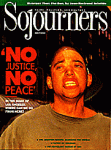How do you spell 'devastated'?" Torri Boozer wanted to know. The assignment I had just given my creative writing group at Sojourners Neighborhood Center in inner-city Washington, D.C., was to write about the events surrounding the verdict in the assault of Rodney King. "Devastated" described the streets of Los Angeles well--I spelled it for her. It wasn't until Torri read to the group what she had written that I realized that she wasn't writing about the streets; she was writing about her soul.
When I was exactly her age--13--riots swept through Harrisburg, Pennsylvania, after the assassination of Martin Luther King Jr. in April 1968. From a comfortable living room 13 miles away in the "chocolate capital" of America--Hershey--I watched on television as flames shot into the night sky and homes burned to the ground.
Those riots changed my life. They opened my eyes to a world beyond the security and privilege of my upbringing, setting in motion a quest to find answers to burning questions about injustice and poverty and racism. By summer I was volunteering with children at a church in inner-city Harrisburg--a first, tentative step on a long journey.
In recent years I have occasionally used the word "devastated" to describe how I felt after the riots in 1968. It was the knowledge of a world so different from the one I had been shown that I thought had devastated me. I carried a feeling of betrayal, a sense that I hadn't been told the truth about my country.
But I know now that I wasn't "devastated." The term must be reserved for those who, like Torri, feel the insult and the fear in their flesh and blood.
IT WAS SAID in Hershey 24 years ago that "those people in Harrisburg" (Hershey residents in general were too sophisticated to employ racial epithets) were going to come to our town. They were going to tear down our amusement park and dig up our golf courses (promotional literature boasts "more golf per square foot than any other place in the world" in Hershey), and maybe even blow up our chocolate factory or kill some of us. Some of the rumors were voiced by adults; some were the concoctions of the wild imaginations of my classmates.
It was clear where the fear was rooted. We had something to protect. And it was hard to understand the desperate actions of people who had nothing left to lose.
Torri Boozer sat and watched the destruction of South Central Los Angeles from 2,600 miles away. But she was closer to the devastation than I was when I sat 13 miles from Harrisburg 24 years ago.
She wrote that she was devastated "because I felt just because he [Rodney King] was black he got treated this way." Keisha Riddick, also in the writing group, wrote, "I was shocked when I saw what happened. Some whites still can't stand us."
It's a terrible truth for a 13-year-old to bear.
Keisha also wrote about being moved by Rodney King's tears as he pleaded for an end to the rioting. That image will remain with many of us. Indeed, we must be moved by all the tears--including the tears of black children who know that they too were beaten by a verdict in Los Angeles.
"A lot of people got hurt," wrote Keisha of the rioting. "And we don't want that up here in Washington." Keisha doesn't have the advantage of having grown up in America's "chocolate capital"; the moniker of her hometown is "murder capital." She lives in the city with the highest rates of all the major death indicators: infant mortality, homicide, and AIDS. How long before it blows here?
The children of my neighborhood--and urban war zones everywhere--need to hear voices out of the ashes that whisper life and affirmation and possibility. One such voice we listened to was that of poet Lucille Clifton, as the writing group read together her poem "Listen Children":
listen children
keep this in the place
you have for keeping
always
keep it all ways
we have never hated black
listen
we have been ashamed
hopeless tired mad
but always
all ways
we loved us
we have always loved each other
children all ways
pass it on
And on. And on. Until white America gets the message.
Joyce Hollyday was associate editor of Sojourners when this article appeared.

Got something to say about what you're reading? We value your feedback!
